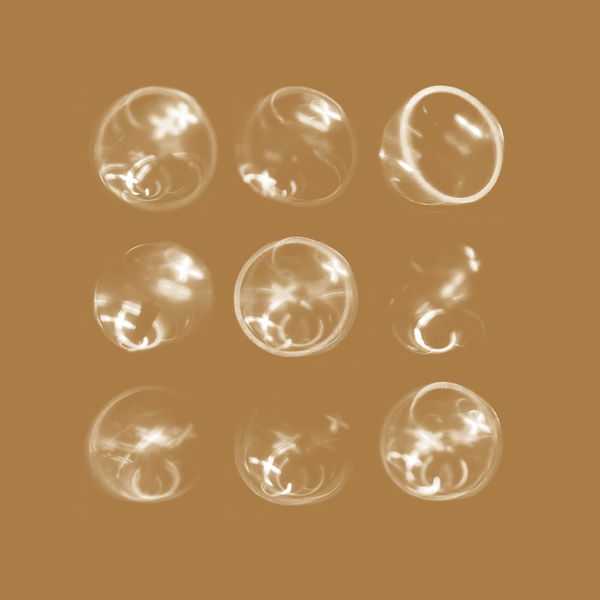
Unlimited Streaming
Listen to this album in high quality now on our apps
Start my trial period and start listening to this albumEnjoy this album on Qobuz apps with your subscription
SubscribeEnjoy this album on Qobuz apps with your subscription
Digital Download
Purchase and download this album in a wide variety of formats depending on your needs.
Ryan Teague's follow-up to his Type debut, the 2005 Six Preludes EP, is ambitious, to say the least. Appearing on almost every track is the Cambridge Philharmonic Orchestra, conducted by Tim Redmond. Ambitious indeed for an electronic artist, yet understated, as Teague is anything but pompous. Throughout Coins and Crosses, he attempts to fuse melodic orchestral compositions and textural electronics, to various degrees and with varying results. Teague's music is closer to Mahler's than Beethoven's: slow chords, melancholy moods, movements of turmoil repressed by an overbearing languor. This is all particularly obvious in "Fantasia for Strings," in which there are no electronics at all. Surprisingly, the piece never feels out of place on the album, which means that either Teague succeeds in his fusion of orchestra and electronics, or that his electronics are superfluous elsewhere on the album. In the two "Tableau" and "Accidia," Teague's abstract sounds intermingle with the orchestral textures to great effect, especially in "Tableau II," where the orchestra's suspenseful crescendos feel like just another layer of electronics, yet could not have had the same impact were it another layer of electronics. Many experimental electronica artists have played with orchestral ideas in the past, from Fennesz's heavily treated textures to Robert Lippok's use of Mahler samples (see Open Close Open), but Teague takes it further by turning the "(ab)use" of the orchestra into a genuine fusion of genres. It should not come as a surprise if the actual result feels somewhat akin to new age music -- some listeners will undoubtedly find Coins and Crosses too syrupy. Then again, the Type label has been running circles around that territory for a little while, and there is no denying the artistic accomplishment this album represents.
© François Couture /TiVo
You are currently listening to samples.
Listen to over 100 million songs with an unlimited streaming plan.
Listen to this playlist and more than 100 million songs with our unlimited streaming plans.
From €13,50/month

Ryan Teague, Composer, MainArtist
Type Type
Ryan Teague, Composer, MainArtist
Type Type
Ryan Teague, Composer, MainArtist
Type Type
Ryan Teague, Composer, MainArtist
Type Type
Ryan Teague, Composer, MainArtist
Type Type
Ryan Teague, Composer, MainArtist
Type Type
Ryan Teague, Composer, MainArtist
Type Type
Ryan Teague, Composer, MainArtist
Type Type
Ryan Teague, Composer, MainArtist
Type Type
Album review
Ryan Teague's follow-up to his Type debut, the 2005 Six Preludes EP, is ambitious, to say the least. Appearing on almost every track is the Cambridge Philharmonic Orchestra, conducted by Tim Redmond. Ambitious indeed for an electronic artist, yet understated, as Teague is anything but pompous. Throughout Coins and Crosses, he attempts to fuse melodic orchestral compositions and textural electronics, to various degrees and with varying results. Teague's music is closer to Mahler's than Beethoven's: slow chords, melancholy moods, movements of turmoil repressed by an overbearing languor. This is all particularly obvious in "Fantasia for Strings," in which there are no electronics at all. Surprisingly, the piece never feels out of place on the album, which means that either Teague succeeds in his fusion of orchestra and electronics, or that his electronics are superfluous elsewhere on the album. In the two "Tableau" and "Accidia," Teague's abstract sounds intermingle with the orchestral textures to great effect, especially in "Tableau II," where the orchestra's suspenseful crescendos feel like just another layer of electronics, yet could not have had the same impact were it another layer of electronics. Many experimental electronica artists have played with orchestral ideas in the past, from Fennesz's heavily treated textures to Robert Lippok's use of Mahler samples (see Open Close Open), but Teague takes it further by turning the "(ab)use" of the orchestra into a genuine fusion of genres. It should not come as a surprise if the actual result feels somewhat akin to new age music -- some listeners will undoubtedly find Coins and Crosses too syrupy. Then again, the Type label has been running circles around that territory for a little while, and there is no denying the artistic accomplishment this album represents.
© François Couture /TiVo
About the album
- 1 disc(s) - 9 track(s)
- Total length: 00:50:26
- Main artists: Ryan Teague
- Composer: Ryan Teague
- Label: Type
- Genre: Electronic
Type Type
Improve album information
 Why buy on Qobuz...
Why buy on Qobuz...
-
Stream or download your music
Buy an album or an individual track. Or listen to our entire catalogue with our high-quality unlimited streaming subscriptions.
-
Zero DRM
The downloaded files belong to you, without any usage limit. You can download them as many times as you like.
-
Choose the format best suited for you
Download your purchases in a wide variety of formats (FLAC, ALAC, WAV, AIFF...) depending on your needs.
-
Listen to your purchases on our apps
Download the Qobuz apps for smartphones, tablets and computers, and listen to your purchases wherever you go.


